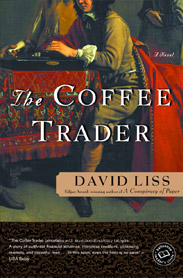In this novel David Liss recreates Dutch Amsterdam at the time when the city represented center of commerce in Western Europe and where practice of religious tolerance was a norm (unlike most of other places in Europe).
The story focuses on Jewish diaspora in Amsterdam. Some of these Jewish people in Amsterdam came from Iberian peninsula where they were targeted by Inquisition. They brought with them their traditions and laws that were somewhat different from Jewish traditions observed by other Jewish migrants from Eastern Europe.
At its core the novel is a fictional account of international trading scheme that eventually would make coffee a must to have household drink in Western Europe.
This is very interesting read with quite dramatic ending.
posted by David



